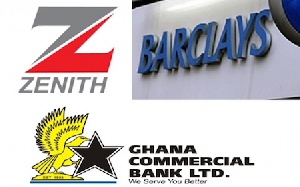Universal banks are feeling the pinch of the challenges in the Ghanaian economy and recording mixed results, according to their third quarter unaudited financial statements.
Out of five financial statements analyzed by Business Finder so far, only Ecobank Ghana and CAL Bank witnessed some marginal growth in their bottom line.
GCB Bank, Standard Chartered Bank and Societe Generale (SG) Ghana all recorded declines in profits for the first nine months of 2015.
The trend is expected to continue with the other banks that are expected to release their financial statements from now till the end of November.
While CAL Bank recorded a marginal 10.63 percentage growth in profit for the third quarter of 2015, that is GH¢114.25 million, Ecobank Ghana saw its profit going up by an appreciable 24.82 per cent to GH¢287.6 million for the first nine months of 2015.
Customer deposits at the end of September 2015 for CAL stood at GH¢1.35 billion as against GH¢926 million the same period a year ago.
Credit loss expenses was, however, higher at GH¢17.4 million during the third quarter of 2015 as against GH¢15.35 million a year ago.
For Ecobank Ghana, net interest income grew by 24.7 percent from GH¢400.6 million in September 2014 to GH¢499.87 million at the end of September 2015.
Impairment charge on loans and advances however reduced to GH¢ 4.56 million during the first nine months of 2015 as against GH¢35 million the same period in 2014.
Loans and advances to customers was higher at GH¢ 3.3 billion in September 2015 as against GH¢2.66 billion a year ago.
It also recorded the industry’s biggest stated capital of GH¢ 226 million.
Ghana’s biggest bank GCB, however, witnessed a decline in profit from GH¢ 202.7 million at the end of September 2014 to GH¢ 162.8 million on September 30, 2015.
Though net interest income grew from GH¢427.8 million in September 2014 to GH¢532.6 million at the end of the third quarter of 2015, impairment charge on loans was very high at GH¢83.1 million in September 30, 2015, compared with GH¢15.6 million the previous year.
Its earnings per share during the period was GH¢0.82 lower than GH¢1.02 a year ago.
SG Ghana also recorded a decline in profit for the third quarter of 2015. It posted GH¢36.7 million in September 2015 as against GH¢35.1 million the previous year.
Net interest income was, however, GH¢151.16 million in September 30, 2015, as against GH¢107 million the same period a year ago.
The bank cut its loans and advances to customers because of the high default rate among clients. It, however, advanced GH¢830 million to customers in the first nine months of this year as against GH¢932 in September 31, 2014.
It also experienced a decline in its basic earnings per share. It recorded GH¢0.140 per share at the end of September 2015 as against GH¢0.146 in September 30, 2014.
For Standard Chartered Bank, which announced a cut in its loans and advances earlier in the year, profit dropped from GH¢197.5 million in quarter three 2014 to GH¢151.5 million during the first nine months of this year.
Loan impairment was also higher at GH¢38.2 million in September 31, 2015, as against GH¢15.6 million the previous year. As a result, the bank’s loans and advances for the third quarter of 2015 was lower at GH¢1.3 billion compared with GH¢1.4 billion in quarter three 2014.
Meanwhile, some banks continued to record very high non-performing loans in their books. So far Stanchart has the highest NPL ratio of 30.23 percent in the banking industry. However, Ecobank Ghana has the lowest NPL ratio of 2.57 percent.
During the first quarter of this year, commercial banks invested 73.3 percent of their investments alone in short-dated instruments. The figure is expected to go up following the tightening of the monetary policy by the Bank of Ghana.
Business News of Sunday, 8 November 2015
Source: The Finder

















